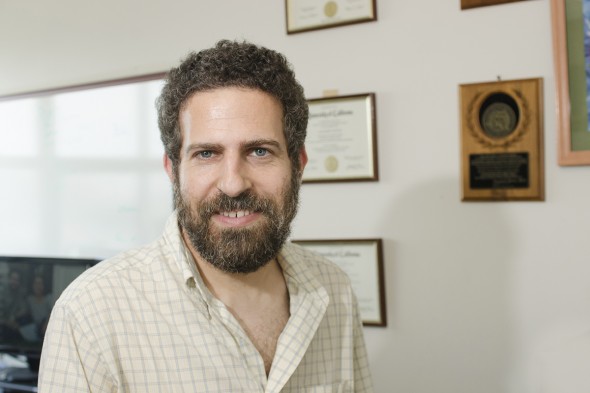Alan Schwartz ponders tough medical choices

Physicians must ask patients the right questions, says Alan Schwartz, professor of clinical decision making. “If the doctor doesn’t find out you lost your job and can’t afford expensive medications, you won’t be able to fill prescriptions and you’ll get worse,” he says. Photo: Joshua Clark/UIC Photo Services (click on image for larger file size)
Alan Schwartz, an expert on medical decision making, asks you to imagine that you’re blind.
Now, further imagine that he has a magic pill or miracle surgery that will restore your sight. But there’s a catch — it will shorten your life by a certain number of years.
Say it’s three years out of a life expectancy of 30 years — many people would say, “Go ahead, give me the pill or do the surgery.”
But what if your life would be shortened by 10 years. Would it be worth that to see again?
“Eventually you get to the point where you’re on the fence,” said Schwartz, professor of clinical decision making and associate head of the department of medical education.
Finding an example in recent news, Schwartz noted that the actress Angelina Jolie had undergone surgery.
“She had to decide whether to spend the rest of her life with a double mastectomy or the likelihood of developing breast cancer,” he said.
To get good medical decisions, physicians must be smart about interviewing patients.
“One major area of research I’m involved in is why physicians fail to appreciate something unique about a patient,” he said.
“Asthma, for example. If the doctor doesn’t find out you lost your job and can’t afford expensive medications, you won’t be able to fill prescriptions and you’ll get worse.”
So the physician needs to ask more questions in order to find a solution, such as an inexpensive generic inhaler for the asthma sufferer.
Schwartz is co-author of the book Making Medical Decisions: A Physician’s Guide. It translates theory and research findings in decision science into practical approaches to help physicians guide their patients’ decisions.
In January he became editor in chief of Medical Decision Making, a peer-reviewed journal published eight times a year.
Schwartz is also co-author of a book on a completely different subject. It’s Stopping Spam: Stamping Out Unwanted Email and News Postings.
“Spam-filtering systems have gotten better” since the book came out in 1998, he said. “At UIC, the ACCC [Academic Computing and Communications Center] folks do a really good job.”
How did he come to write the book?
“I was in graduate school and I needed the money,” he said. “It was a burgeoning topic where I could get a publisher. I had no higher mission than that.”
Schwartz, who got his first computer for his 8th birthday, added, “Spam was annoying, and I knew something about it.”
He is the director of APPD LEARN (Longitudinal Educational Assessment Research Network) for the Association of Pediatric Program Directors.
“The network is a collaborative of over 110 pediatric residency programs that want to work together on multi-site educational research,” he said.
Schwartz grew up in Los Angeles. Asked where he earned his college degrees, he replied, “Berkeley, Berkeley, Berkeley” — his bachelor’s and master’s degrees and Ph.D. are all from the University of California, Berkeley.
He’s been at UIC since 1997, and received an Award for Excellence in Teaching in 2009.
He lives in Oak Park with his wife, M.G. Bertulfo, who teaches creative writing to children in her studio in the Oak Park Arts District. They have a 12-year-old son.
“I love to knit,” Schwartz said. There was a period when anyone who was expecting a present from him knew it would be a hand-knitted hat, sweater or scarf.
“But over the last year and a half I’ve not done as much as I would like to,” he said.
Asked what is so enjoyable about knitting, Schwartz said, “It’s a physical activity that I find to be meditative. And the yarn is soft, I like the feel of it.
“I’m kind of a crafty person. I like the idea that I can take a piece of yarn and make something I could wear and stay warm.”
